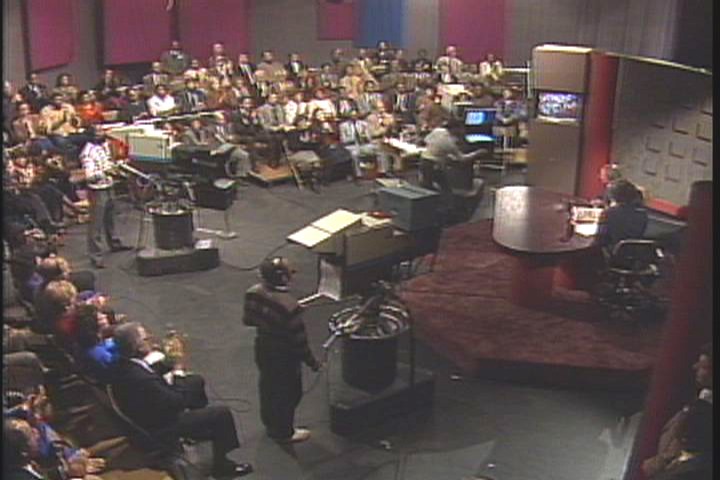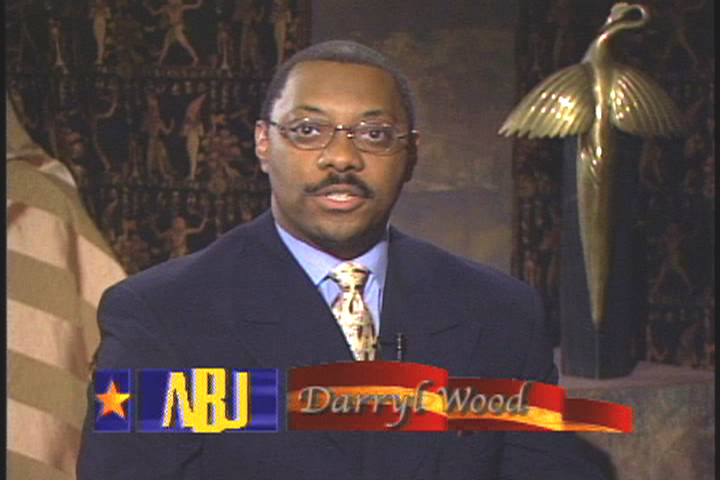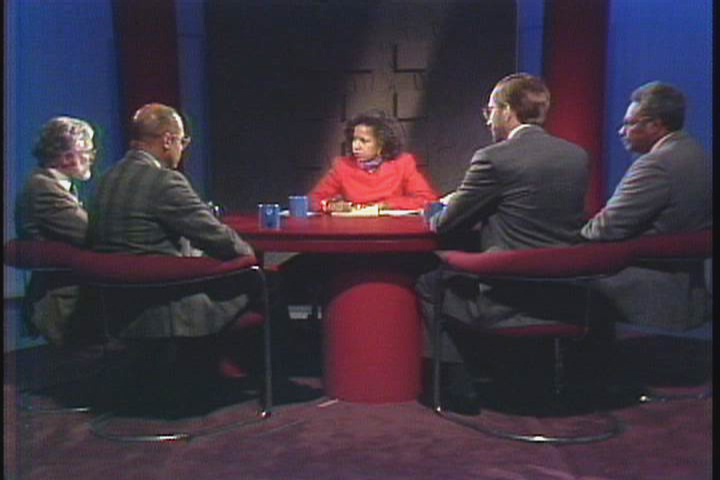ABJ Story
 American Black Journal, originally titled Colored People's Time, went on the air in 1968 as a televised public forum for black Americans during a historic moment of racial turmoil across the nation. During its thirty-six-year run, the show (under different titles and formats) has documented Detroit and American history from African-American perspectives. The show represents a unique national treasury, possessing one of the most extensive audio-visual records of local African-American history and culture in existence, recorded in the city with the third largest black population in the United States. While many extant collections are limited to the contributions of African-Americans in specific areas such as civil rights or music, ABJ explores the entire spectrum. The collection includes interviews, round table discussions, field-produced features, and artistic performances by African-Americans, many from among the nation's most-recognized African-American experiences. The collection also contains in-studio interviews and on-location footage that examine such issues and events as work in the automobile industry, nationwide urban civil disturbances in 1967 (including those in Detroit), the development of strong African-American political leaders, the explosion of Motown music and the emergence of rap, the rise of mainstream business leaders, and the enduring importance of religion within African-American culture. In its thirty-six years of programming, the ABJ has highlighted leading figures in the worlds of sports, economics, academics, international relations, the law, and religion. The show's first-person approach is particularly valuable for public presentations of history, while the ABJ materials provide faces and voices to the key aspects of African-American culture and history over the last third of the century.
American Black Journal, originally titled Colored People's Time, went on the air in 1968 as a televised public forum for black Americans during a historic moment of racial turmoil across the nation. During its thirty-six-year run, the show (under different titles and formats) has documented Detroit and American history from African-American perspectives. The show represents a unique national treasury, possessing one of the most extensive audio-visual records of local African-American history and culture in existence, recorded in the city with the third largest black population in the United States. While many extant collections are limited to the contributions of African-Americans in specific areas such as civil rights or music, ABJ explores the entire spectrum. The collection includes interviews, round table discussions, field-produced features, and artistic performances by African-Americans, many from among the nation's most-recognized African-American experiences. The collection also contains in-studio interviews and on-location footage that examine such issues and events as work in the automobile industry, nationwide urban civil disturbances in 1967 (including those in Detroit), the development of strong African-American political leaders, the explosion of Motown music and the emergence of rap, the rise of mainstream business leaders, and the enduring importance of religion within African-American culture. In its thirty-six years of programming, the ABJ has highlighted leading figures in the worlds of sports, economics, academics, international relations, the law, and religion. The show's first-person approach is particularly valuable for public presentations of history, while the ABJ materials provide faces and voices to the key aspects of African-American culture and history over the last third of the century.
Hosts and Formats
 The program's format, style, and content shifted with the times and with the producers. In addition to conventional interviews with African-American citizens and leaders, ABJ explored current and critical issues through on-location footage, staged performances, and through the edited program format. The first host of Colored People's Time in 1968 was Tony Brown, who went on to produce Tony Brown's Journal, currently the second longest running public affairs show on PBS. After Brown left CPT, the series was re-titled Detroit Black Journal and host George Martin continued to cover critical issues while increasing the musical content of the programming.
The program's format, style, and content shifted with the times and with the producers. In addition to conventional interviews with African-American citizens and leaders, ABJ explored current and critical issues through on-location footage, staged performances, and through the edited program format. The first host of Colored People's Time in 1968 was Tony Brown, who went on to produce Tony Brown's Journal, currently the second longest running public affairs show on PBS. After Brown left CPT, the series was re-titled Detroit Black Journal and host George Martin continued to cover critical issues while increasing the musical content of the programming.
The next host (from approximately 1975 to 1978) was Ron Scott, a social justice activist in Detroit, who brought a hard-hitting slant to the program. From 1979 to 1984, under the host Ben Frazier, the program shifted to a documentary style that featured monthly topical documentaries rather than in-studio interviews and performances. During this period, Deborah Ray was the Associate Producer of the program (1977-1979) and then Producer (1980-1983) with Juanita Anderson serving as Executive Producer from 1981-1984. As host from 1984 to 1988, Ed Gordon returned DBJ to an interview-style format. From Gordon's tenacious interviewing style emerged a tough yet friendly relationship with his interviewees, most noticeable in numerous interviews with Jesse Jackson during that period. These types of diversity of opinion, debate and critique within African-American communities are essential to the intellectual goals fostered by this journal. Under the title American Black Journal, Darryl Wood led the show for the next ten years. His show emphasized the skills and talents of many of the nations leading Africa-American business people. Ken Brown, the current host of the program, brings his own distinctive personality to the show's already strong tradition. The various shifts in programming style and format, since the late 1960s, reflect the historical changes in the role of the media and the socioeconomic diversity of the African-American community.
The variety of formats produced engaging and diverse content. Jazz vocalist and Detroit native Anita Baker reflected on the role of music throughout her family life. The Rhythm and Blues group, the Spinners, performed on a stage custom-built in the DPTV studio. Host Ron Scott both interviewed the group and learned their dance steps. Jazz vocalist Nancy Wilson brought out a softer side of the usually business-minded Darryl Wood. While Wynton Marsalis, interviewed is the mid-1990s, offered a reflection on his hero, Louis Armstrong, as well as on the vicissitudes of fame, critics and popular American music.
The period of documentary-style production created other unique and important video footage as well. Renowned poet, librarian and pioneering publisher Dudley Randall was interviewed at his home, from which he published Detroit's Broadside Press. Interviews with classic jazz vocalist Betty Carter and avant-garde jazzman Sun Ra also took place during this documentary phase of DBJ. When interviewed in the cramped quarters of her dressing room at Detroit's Music Hall, Carter mused about the history of jazz as well as her own jazz heroes, particularly Sarah Vaughn. Sun Ra, on the other hand, was recorded on-location in a small Detroit jazz hot spot of the time.
Guests
 Many high-profile African-Americans were interviewed while in Detroit to participate in local events. The range of guests included leaders from the U.S. civil rights movement and the music industry, as well as leading members of the business community. Alex Haley, an historian and the author of Roots, was interviewed prior to his public lecture at Eastern Michigan University. Dr. Benjamin Carson, a neurosurgeon from Johns Hopkins University, appeared on ABJ while visiting his Detroit home after the completion of a tour promoting his inspirational book, Gifted Hands. Cornel West, the Harvard professor and philosopher, appeared on ABJ during his book tour for Race Matters. His powerful, yet down-to-earth, discussion illuminated how the issues and politics of race affect the entire nation. ABJ also interviewed Lerone Bennett, a prominent journalist, historian and author of Forced into Glory: Abraham Lincoln's White Dream, a polarizing critique of the sources for Lincoln's abolitionist policies and commitments.
Many high-profile African-Americans were interviewed while in Detroit to participate in local events. The range of guests included leaders from the U.S. civil rights movement and the music industry, as well as leading members of the business community. Alex Haley, an historian and the author of Roots, was interviewed prior to his public lecture at Eastern Michigan University. Dr. Benjamin Carson, a neurosurgeon from Johns Hopkins University, appeared on ABJ while visiting his Detroit home after the completion of a tour promoting his inspirational book, Gifted Hands. Cornel West, the Harvard professor and philosopher, appeared on ABJ during his book tour for Race Matters. His powerful, yet down-to-earth, discussion illuminated how the issues and politics of race affect the entire nation. ABJ also interviewed Lerone Bennett, a prominent journalist, historian and author of Forced into Glory: Abraham Lincoln's White Dream, a polarizing critique of the sources for Lincoln's abolitionist policies and commitments.
Music industry professionals also appeared on the show. Berry Gordy, found of Motown Records, reflected on the creation of Motown as well as on his background and family life, including his childhood in black neighborhoods in Detroit during the early party of the twentieth century. Entertainer Eartha Kitt performed in one of the earliest existing program tapes. On the same tape, Kitt, who appeared during the height of her career while on tour in Detroit, pondered the city's position as a center of black music in America. James Brown, the & "Godfather of Soul," appeared on the show several times. In an extensive interview conducted on location at Detroit rhythm-and-blues station, WCHB, Brown discussed his philosophy as an early musician and businessman. When mainstream stations stopped playing R&B music, Brown began investing in radio stations in his home state of Georgia in order to have more control over the music played and in order to create venues for his own records.
ABJ hosts have also interviewed numerous black actors, including Danny Glover; Dick Gregory, comedian and social activist; Arthur Mitchell, founder of the Dance Theatre of Harlem; and Ossie Davis, whose summer high school acting workshop has been a yearly inspiration to Detroit 's black youth. Davis discussed his life history, particularly his early years as a black actor in an exclusively black theater circuit.
The late Coleman A. Young, long the powerful mayor of Detroit, appeared on the show several times to speak about his efforts to shape the city, to confront critics, and to fight for racial justice. Young's dynamic manner made for several lively appearances, particularly in his early years as mayor in the late 1970s and early 1980s. ABJ also aired interviews with leaders from both the civil rights and black protest movements in the United States and abroad. Julian Bond, chairman of the NAACP, spoke on black history, and the intellectual and political roots of the NAACP. Louis Farrakhan, religious leader of the Nation of Islam, gave an intense interview in the mid-1980s. Civil rights leader Rev. Jesse Jackson also appeared on the program several times. Others who appeared over the years include Rev. Joseph E. Lowery, founder of the Southern Christian Leadership Conference; Lani Guinier, nationally known civil rights attorney; Bobby Seale, former Black Panther and politician; Myrlie Evers-Williams, widow of slain civil rights leader Medgar Evers; Carl T. Rowan, journalist; Dr. Yosef ben-Jochannon, historian and author; Bishop Desmond Tutu, religious leader of South Africa; and Yolanda King, daughter of Martin Luther King, Jr.
ABJ guests also included leading black entrepreneurs and personalities such as: Earl Graves, publisher of Black Enterprise and Essence magazines; Wally Amos, founder of Famous Amos Cookies; Les Brown, motivational speaker; Jackie Joyner-Kersee, Olympic track champion; NBA star Isaiah Thomas; Dave Bing, businessman and former Detroit Pistons basketball star; and broadcaster Greg Gumbel.





